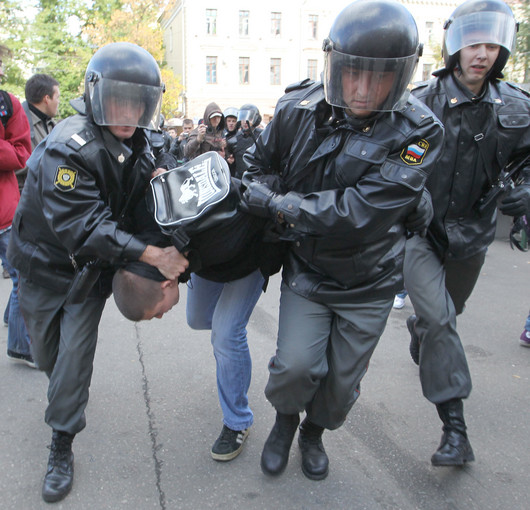
Moscow’s Aggressive Assimilation Policy May Spur a Further Growth of Nationalism
Publication: Eurasia Daily Monitor Volume: 8 Issue: 181
By:

At a press conference in Karachaevo-Cherkessia on October 1, Moscow’s envoy to the North Caucasus, Aleksandr Khloponin, admitted that the North Caucasus still has excessive unemployment. Khloponin stated that the situation is especially “lamentable” in Dagestan, Chechnya and Ingushetia. At the same time, Moscow’s envoy claimed that unemployment in the region decreased by 100,000 in the last year, from 436,000 to below 350,000. Khloponin reiterated the government’s plans to create 400,000 new jobs in the North Caucasus by 2025 (www.kchr.info, October 1).
Claims that the unemployment rate has decreased in the North Caucasus are hard to verify, as different Russian government agencies give different estimates. For example, the official website of the Russian ministry for regional development states that the jobless rate in Dagestan is only 3.8 percent, while it puts the unemployment rate in Ingushetia at 22.3 percent and 59.2 percent in Chechnya (https://minregion.ru, accessed on October 2). If this were true, Dagestan would have no need of government programs to provide more jobs. But other sources provide different numbers for the same republics. According to the Independent Institute for Social Policy, Dagestan had an average unemployment rate of 13 percent in the first half of 2011, which is about the same as in 2008, but two percent lower than in same period of 2010, while Chechnya and Ingushetia had average unemployment rates in the first half of 2011 of 34 percent in Chechnya and 48 percent in Ingushetia (https://www.socpol.ru/atlas/overviews/social_sphere/kris.shtml, accessed on October 2).
Whatever the estimates, the Russian government apparently still regards unemployment as a substantial problem in the North Caucasus. However, Moscow’s approach is not linear: it does not imply simply increasing employment opportunities for the local population. The task set by the government is more complicated – that is, to facilitate the non-Russian population of the North Caucasus to migrate to other parts of Russia and to replace them with ethnic Russians. Earlier, Khloponin said in an interview with the Russian English-language TV channel Russia Today that the North Caucasus needs ethnic Russians because Russian is the lingua franca of the region. Khloponin said that the North Caucasus badly lacked professionals that only ethnic Russians could supply. He failed to substantiate his claims with numbers, but promised “preferences for organizing the inflow of ethnic Russians into the North Caucasus” (www.rbc.ru, September 30).
Thus a large portion of the 400,000 jobs to be created in the North Caucasus by 2025, mainly by means of building ski resorts, is apparently to go to ethnic Russians who are to be lured to the region. The Soviet government implemented similar projects in the North Caucasus, which boosted the proportion of ethnic Russians in the region. However, even when they succeeded, the newcomers eventually left the region. Under the current circumstances, Moscow will face additional obstacles. First, nationalism has substantially grown among the North Caucasians and Russians. Second, the security situation is unstable in a majority of the republics, which precludes developing tourism. Third, the political power on the ground is in the hands of the local elites, who can sabotage Moscow’s projects even if they cannot openly challenge the central government. Fourth, the current Russian government has no power to send people to the North Caucasus en masse the way the Soviet government did. Fifth, the economic viability of the project is questionable, so it will be hard to find private investors to implement the tourism projects. If private investors are found, they might want to implement the project differently, not as the government wants.
It is also unclear what impact economic improvement in the North Caucasus would have on the Russian public against the backdrop of a worsening situation in rest of Russia. A coalition of Russian democrats and nationalists has launched a public campaign “Stop feeding the Caucasus!” They claim that Moscow and the local elites in the North Caucasus have a reciprocal relationship, in which Moscow supplies increasingly greater amounts of resources to the republics and the latter pays it back with virtually any voting results that Moscow wants. The activists are calling on the government to put an end to this relationship (https://rusplatforma.org/publikacii/node172/, accessed on October 2). Indeed, in the previous elections, all the North Caucasian republics reported unusually high voter turnout numbers and support for the incumbent authorities.
Khloponin claimed at his press conference that Moscow spends more resources per capita in the Russian Far East or Siberia than in the North Caucasus. He said government money was actually not spent so much on economic projects in the North Caucasus as on guarantees for private investors (www.kchr.info, October 1). However, this argument is likely to fall on the deaf ears of Russian nationalists, who tend to view the North Caucasus as alien territory compared to regions populated by ethnic Russians.
On October 1, Russian nationalists organized several rallies in Moscow. It is noteworthy that the slogans of the nationalists increasingly convey more rational ideas. One of the protest actions demanded the implementation of a visa regime between Russian republics, on one side, and the North Caucasian republics and CIS countries, on the other. Some of the protests were officially sanctioned, but one group of protesters marched to the headquarters of the Russian government without permission and was dispersed by riot police (https://echo.msk.ru/blog/varlamov_i/816957-echo). Russian media largely ignored these events, so most of the information came from the blogosphere.
As Moscow advances the ideas of accelerated assimilation of the North Caucasus, it increasingly appears to face opposition not only in the North Caucasus, but also domestically, from Russian nationalist groups. With parliamentary and presidential elections looming in Russia, this issue may have a serious impact on Russian politics. To avoid serious opposition to his presidential bid, Vladimir Putin will have to appease Russian nationalists while at the same time heeding the North Caucasian elites’ concerns.




